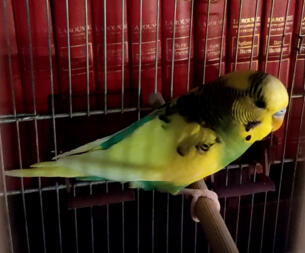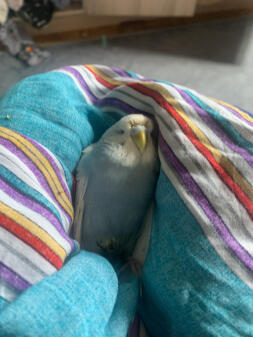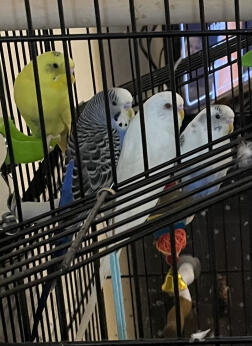Happy Tweets
A single, monotonous, sharp tweet, sounding something like chirrup! is the parakeet’s commonest sound. It means all kinds of things to do with general, busy contentment. Throughout the day, this sound will be a non-stop reassurance to the parakeet, its cage-mates, and you, that everything is cool. It also helps the birds to bond as a flock, and often means nothing more than "I'm here!" It’s the kind of noise a bird that can’t stop making noises needs to make when there’s not much to say!
Unhappy Tweets
The chirrup is a versatile sound, and when it's repeated loudly several times - or few several minutes, if you don't come running - the parakeet is alerting you to a problem. No food, perhaps, or no water, or possibly some other cage-related problem such as a dislodged perch or swing, or something outside the cage that the parakeet is not too happy with. An even louder, insistent call, sounding something like tweweet!, means the parakeet is getting super-excited about something. It might be the arrival of a new pet, or bird sounds drifting in from the garden. It could also be a contact call to a fellow parakeet who simply isn't paying enough attention. If the tweet becomes very loud and non-stop, It means the parakeet is alarmed by something in the immediate environment, and the chirruping will soon turn into outright squawking. If the bird is not happy with its cage set up, it may make this sound when there are no other obvious changes in the room or cage. In this case, you may need to check the cage set up to see what the issue might be.

Parakeet chatter - this bird's posture shows he's settled in for a good talking session
Squawking
One step up from the insistent angry tweet mentioned above, the full-blown squawk is the sound that no parakeet owner wants to hear. The other parakeets in your cage or aviary will get edgy when they hear it, too. But it’s a noise with a purpose, and it means something’s wrong. The parakeet may have been frightened by something, or may be injured. There may be predators on the scene (real or imagined). Or the bird might just be angry because those earlier tweets didn’t bring you running to replenish the water dispenser or food bowls! Then again, the noise might be fuelled by hormones – in the breeding season, parakeets can become anxious. A male might shout for a mate, and a female might shout for someone to give her an excuse to start nest-building, in which case it will pass eventually. Birds in a mating mood tend to be short-tempered and noisy.
To diffuse the problem, try talking to the squawking parakeet in a gentle voice. Check the body language – if the bird’s feathers are close to its body, it’s frightened. Covering the cage will quieten things down, while you investigate the cause of the problem. If you don’t think it was a mating tantrum, check for noise, fumes, other pets, and naughty kids in the environment.
Chattering
A chattering parakeet is contented. Birds who are settling in for a long chatter will sit, shoulders slightly hunched, and engage in a musical, mumbled conversation with themselves. This is when they’ll use the words you’ve taught them. The parakeet will sit still during this relaxing babbling, feathers slightly fluffed up as a visible sign of being chilled out.
Male parakeets use this kind of chatter to woo female birds. In the absence of a member of the opposite sex, a male parakeet will often chatter and twitter into his mirror. This amorous song is often accompanied by head-bobbing movements and erect head feathers.
Singing
For all their vocalizations, parakeets don’t sing, as such – not in the way that finches and thrushes sing, for example. After all, these guys are parrots, not songbirds. But they have a rich repertoire of chirrups, whistles, chatter, trills and various other snippets they’ve picked up (including human speech). They put it all together in a medley of tuneless put very pleasant “song”. Happy parakeets will “sing” together, and singing is always a sign that the birds are feeling good.

A singing parakeet is a happy parakeet
Chiding
Parakeets sometimes produce a kind of hissing sound, sounding a bit like tssssk! They use it if their personal space has been invaded, when they’re nesting, or if they’re feeling intimidated in an overcrowded environment. It’s a warning sound, telling whoever or whatever is annoying them to back off. If you hear this noise a lot, it probably means there's not enough personal space for the parakeet in its cage. In larger aviaries, the hissing-chiding sound is simply part of the push and shove of everyday parakeet life – especially at crowded feeding stations.
Beak Grinding
Parakeet’s aren’t chewing food or grit when they sit on a perch making a crackling, grinding sound. This is a happy noise, the parakeet equivalent of a cat’s purr. They make it by rubbing the two halves of their beak together, and it means they're content, and probably about to settle down for a nap.
Other Sounds
Parakeets have their own favorite sounds. If they hear a tweet, squeak or word that they find pleasing, they may learn it and slot it in as part of their regular repertoire. Some birds are inspired by the noises around them – phones and apps, music, other pets, cars, or human voices. Some of the sounds they come up with just seem to bubble up from their own imaginations, though.

Pet sounds - parakeets are musical little souls
Although they can’t song, as such, parakeets are musical little souls. They will listen to the music you’re playing, and if they like it they will often join in. Your budgie will have its preferred pet sounds, perhaps even a favorite song. Some music will make your parakeet angry for no obvious reason, other than dubious taste, so it’s a good idea to take note of these likes and dislikes, and skipping the death metal, opera, or whatever genre it is that your parakeet dislikes.
Parakeet Body Language
Body language gives just as many clues to the parakeet’s mood as the chattering and vocalising. If the feathers are drawn close to the body, making the parakeet look thinner than usual, it’s sign of fear or stress. Flapping the wings or spreading them out is another sign of unhappiness. Head down and beak wide open is a sign of aggression. If the parakeet is quietly perched and slightly fluffed-up, or just going about its busy business with the other birds in the cage, that’s all good.

























Comments
Kaz, 31 March 2025
Sounds like they want out. If the don’t get to exercise outside the confines of their cage they made we’ll be frustrated and feel angry. Give them some playtime outside their cage, with treats.
Maureen, 25 September 2024
My pudgy was coming on my finger out of the cage. All of a sudden when I come to the cage it hides in the corner. What do I do?
Jim, 12 July 2024
Get him/her a friend they hate being alone it doesn't matter a male or female the you will see a different budgie happy budgies. Jim
Jan, 14 June 2024
I have a gorgeous male budgie called Spice. He’s soooo affectionate but only to me. He keeps on making a screeching sound which he makes when his honey seed stick falls down. We spoil him rotten - he never runs out of honey sticks which he loves. What does it mean when he makes this annoying noise when he appears happy, with fluffy feathers?
Natalie, 18 April 2024
My female budgie is 3 years old and is making a weird chirp sound that sounds almost like a baby bird chirping and I'm worried it is something bad, is there any suggestions to why my budgie is making baby bird chirps. Is it perhaps because she wants to mate with my other male budgie that's in the cage with her by any chance?